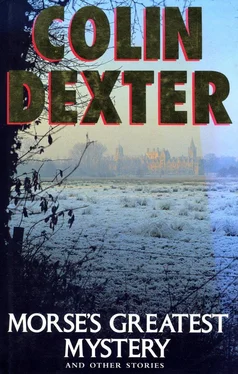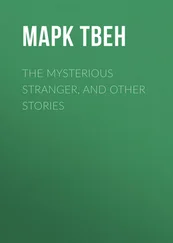“Well, yes — at a distance.”
“Beautiful woman, Mrs. Grainger — very beautiful.”
“Taken quite a few years ago, that photo — she’s probably changed since then.”
“No! You’re wrong about that, sir.”
“How do you know?”
“Because I met her very recently. Met her yesterday morning, in fact. In the Westgate Library. She told me her name was Wendy Allsworth. But it isn’t, sir. It’s Sylvia Grainger.”
“Extraordinary!” said Morse, his voice strangely flat.
“You don’t sound all that surprised.”
“Just tell me one thing. When you took the statement from — from Mrs. Grainger, do you think she knew about the murder?”
“No, I don’t.”
“You didn’t tell her?”
“No. So unless they planned things—”
“Very doubtful!” interposed Morse.
“—Bayley must have rung her up early that morning.”
“Do you think he told her?”
“I don’t think so. If she’d known it was a murder enquiry... No, I don’t think he told her.”
“I agree. She was prepared to go a long way — did go a long way. Not that far, though.”
Lewis hesitated. “You’ll excuse me for saying so, but as I said you don’t sound very surprised about all this.”
“What? Of course I am. From where I sat I couldn’t have recognized the Queen if she’d been in that photo. The old eyes are not as sharp as they were.”
“You knew , though, didn’t you?” asked Lewis quietly.
“Not all of it, no,” lied Morse.
Yet Lewis’s silence was saddeningly eloquent, and Morse finally nodded. Then sighed deeply.
“I’ve always told you, Lewis, haven’t I? The person who finds the body is going to be your prime suspect. That’s always been my philosophy. It’s compulsive with these murderers — they want their victim found . It’d send ’em crackers if the body lay undiscovered somewhere for any length of time.”
“So?” asked Lewis dejectedly.
“So! So I had Bayley brought in this morning — this lunchtime.”
“While I was with the builder.”
“Yes. And Bayley continues to be detained at Her Majesty’s Pleasure.”
“You interviewed him yourself?”
“Yes. And I just told you, there’s no one in the Force so firmly and fairly competent as me — not in that line of business.”
Lewis was smiling wryly now — first nodding, then shaking his head. He might well have known...
He nodded towards the Graingers’ home: “Shall we go and take her in as well?”
“Actually she’s, er, she’s already helping with our enquiries.”
Lewis almost exploded. “But you can’t — you can’t mean...”
“I do, yes. I had Bayley tailed and he went out to meet Sylvia Grainger — in the bar at The Randolph — about a quarter to twelve, that was. She’d told her husband she was going to her sister’s for a few hours. That’s what she said. So! So there’s really not much point in us sitting here freezing any longer, is there?”
Lewis turned the key in the ignition, the Jaguar spurted into life, and the two detectives now sat silently side by side for several minutes as they drove back down into Oxford.
It was Lewis who spoke first: “You know, it really is nonsense what you say, sir — about the first person finding the body. I just don’t know where the evidence is for that. And then you say it’s ‘compulsive’ — didn’t you say that? — for murderers to want the body found. But some of ’em take enormous time and trouble for the body never to be found.”
“You’re right, I agree. I was exaggerating a bit.”
“So what did make you think it was Bayley? There must have been something.”
“It’s all these wretched crosswords I do. You meet some odd words, you know. The first time I saw Bayley in his room I thought what a great big fat-arsed sod he was. And then, this morning, I read Sheila Poster’s story again — and well, things went sort of ‘click.’ You remember that long word Sheila Poster used — about the odd-job man? Mind you, she was an English graduate.”
Lewis did remember, but only vaguely; he’d look it up once they got back to HQ.
“It was always going to be a straightforward case,” continued Morse. “We’d have been sure to find out where Bayley had been working, sooner or later.”
“ ‘Sooner or later,’ ” repeated Lewis. “And for once I thought it was me who was sooner. It’s just like I said: I’ve got a second-class mind — I’m just like a second-class—”
“Ah! That reminds me. Just pull in here a minute, will you?”
Lewis turned into a slip-road alongside a row of brightly lit shops just before the Thames Valley Police HQ buildings.
“Where exactly—?”
“Here! Here’s fine.”
Morse jabbed a finger to the left, and Lewis braked outside a sub post-office.
“Just nip in and get me a book of stamps, please.”
“First- or second-class?” For some reason Lewis was feeling reasonably happy again.
“No need to go wild, is there? I’ll have one book of second-class, all right? These days they get there almost as quickly as first, you know that.”
Morse had been pushing his hands one after the other into the pockets of overcoat, jacket, trousers — seemingly without success.
“You’ll never believe it, Lewis, but...”
“I think I will, sir. Remember what that fellow Diogenes Small wrote about people’s flights of imagination?”
“You’ve been soaring up there yourself, you mean?”
“Not quite, no. All I’m saying is it wouldn’t take a detective to see what you’re trying to tell me.”
“Which is?”
“You haven’t got any money.”
“Ah!”
Morse looked down silently at the car-mat; and Lewis, now smiling happily, opened the driving-seat door of the Jaguar, and was soon to be seen walking towards the premises of the sub post-office in Kidlington, Oxon.
Women sometimes forgive those who force an opportunity, never those who miss it.
(Talleyrand)
It wasn’t often that Professor Rawlins bothered her with his personal letters. Occasionally, though — like this afternoon; and like yesterday afternoon, come to think of it. But he always insisted on putting his own stamps on such letters, never allowing them through the Department’s franking-machine. Bit too obviously self-righteous, she thought. She glanced at the tiny gold watch (a wedding present) on her left wrist: almost a quarter to five. TGFF. Thank God For Friday!
Rawlins took off his half-glasses, pinched the top of his nose, turned over a page of his desk diary, lit another cigarette, and looked across at Carol Summerson.
“Professor Smithson’s coming on Monday morning. Will you nip out first thing and get me a bottle of Glenfiddich?”
Carol made a note, closed her shorthand book, uncrossed her elegant legs, and smiled as she looked at him. And he, half smiling himself, looked back across at her; and she felt pleasingly surprised. (Or was it surprisingly pleased?) There had been so few moments of real communication between them during the three months she’d been working for him — the man she’d more than once heard described as “the cleverest fellow in Oxford.”
She was glad to get out of his office, though. He would never open the window and the smell in the room was invariably horrid. How she wished he’d stop smoking! (John never smoked, thank goodness.) How old was he? Sixty? Overweight, and with a chest that sounded like a loose-strung harp, he was just the sort to die before his time from heart trouble or lung cancer or chronic bronchitis or emphysema — or like as not the whole lot of them listed on his death certificate. Why didn’t his wife do something about him, for Christ’s sake?
Читать дальше












